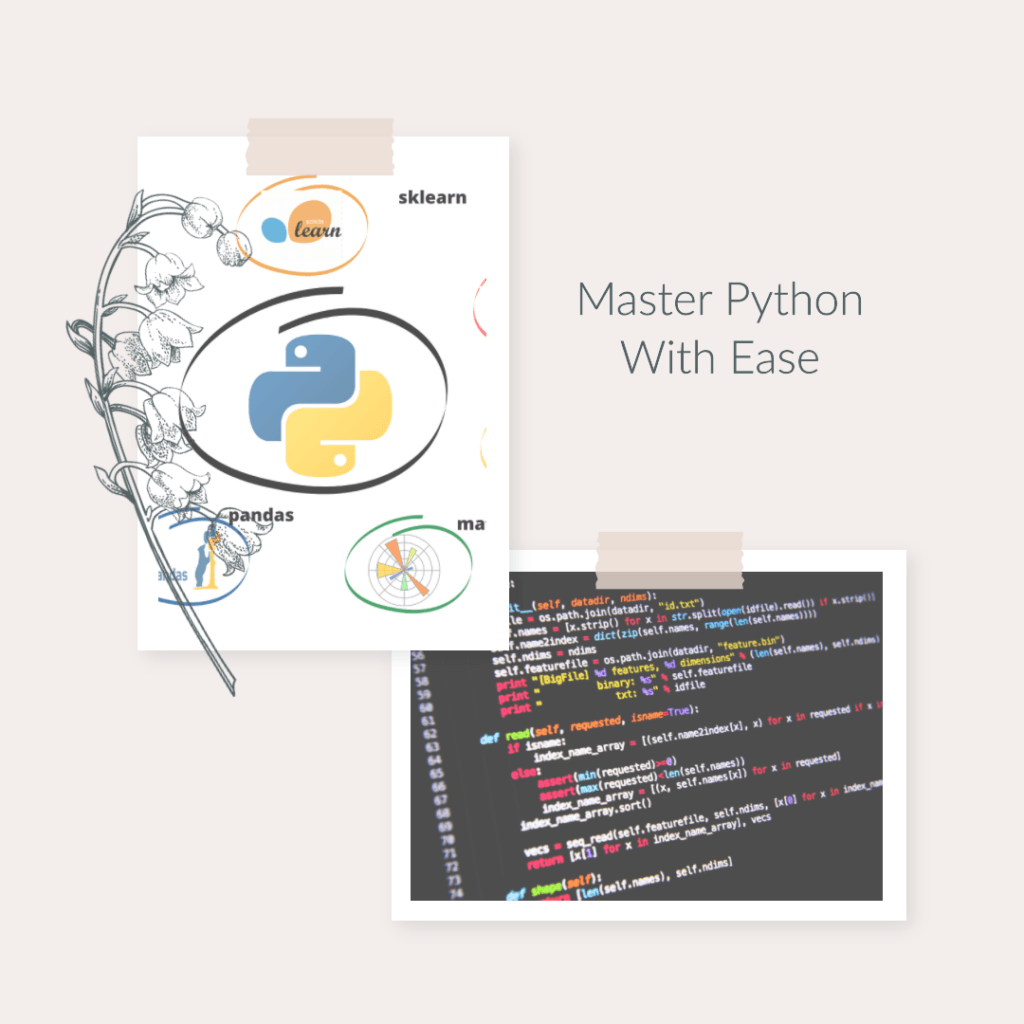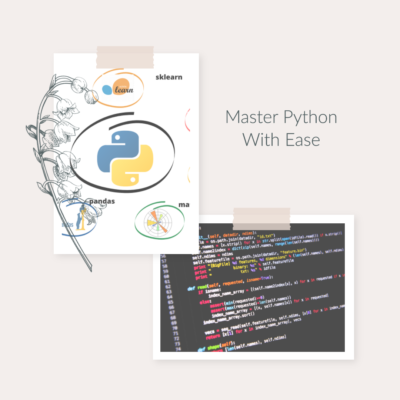Discovering the easiest way to learn Python can be the key to unlocking a smooth journey into the world of programming. With Python’s clean syntax and its reputation as a beginner-friendly language, many are eager to dive in. However, the plethora of available resources can sometimes be overwhelming. In this post, we’ll guide you through the most effective strategies to grasp Python, ensuring a clear and efficient learning experience.

Understanding Python Basics
Just like any language, programming or otherwise, Python has its unique ‘grammar’ or syntax that you need to get comfortable with. This syntax is the set of rules that define how Python programs are written and interpreted. Luckily for us, Python’s syntax is designed to be highly readable, making it simple to grasp for beginners.
The Edge of Python’s Simplicity
Why is Python’s simplicity a plus? Well, Python’s readability makes it a great first programming language — it allows you to think like a programmer and not waste time with confusing syntax. It follows the principle of “Readability Counts,” which makes programs more understandable, easier to maintain, and useful for longer.
Python Basic Commands and Keywords
For starters, Python uses simple keywords and commands that closely resemble the English language. For instance:
printstatement to display textforandwhileloops to iterate over a block of codeif,else,eliffor decision makingdefto define a function
Understanding these commands is a big step towards getting comfortable with Python.
In the following sections, we are going to explore how to get enough practice with Python syntax and recommended resources to help you on your journey. So, if you were looking for the easiest way to learn Python, you’re already on the right path. Stay tuned!
Choosing the Right Learning Resources
In your journey to becoming a Python expert, picking the right resources to fuel your learning is crucial. Books and online courses, reputable tutorial websites, and interactive platforms all play a part in ensuring your Python learning experience is both informative and enjoyable.
The Best Python Beginners’ Textbooks and Online Courses
If you’re keen on self-paced learning, textbooks can be your best bet. Nothing beats the in-depth, step-by-step approach to teaching Python that “Learn Python the Hard Way” by Zed Shaw and “Python Crash Course” by Eric Matthes offer. For online learning enthusiasts, MOOCs like “Learn Python” at Codecademy or Zero to Mastery’s “Python Bootcamp” come highly recommended.
Tutorials Websites and Coding Challenges
Interactive learning is the key to mastering Python, and websites like GeeksforGeeks and HackerRank provide plenty of coding challenges to work your brains out. They not only offer challenges but also provide detailed solutions and explanations to enhance your learning process.
Interactive Platforms for Beginners
Embrace the challenge of learning by doing with platforms like Codecademy and LeetCode! These interactive platforms provide bite-sized tasks that make learning fun and manageable. No matter what your Python proficiency level might be, these platforms give you a chance to apply your knowledge and see nifty bits of code transform into amazing projects. Remember, there’s no better teacher than experience itself.
In conclusion, a plethora of Python learning resources are just a click away. Pick what suits you best and start your Python journey with full confidence. Happy coding!
Learning through Practice
It’s often said that “practice makes perfect,” and this couldn’t be more accurate for programming as well. If you’re on a quest to learn Python, hands-on coding practice is non-negotiable. It propels you further into understanding not only how to write a line of code but how to think like a coder. Programming is more about problem-solving than anything else, and you can’t effectively learn that from reading theory alone.
How do you make this practice count, especially as a beginner? First starters, I suggest you embark on practical projects. Not only do these help you exercise what you’ve learned, but they also bestow you with immensely valuable real-world coding experience. Create personal projects like a simple calculator or a to-do list application; this helps reinforce your foundation and boosts your confidence.
Remember, keep practicing; it’s the cornerstone to learning Python. Now, let’s delve into the Python community and why it will do wonders on your Python journey.
Turning to the Python Community
There’s a saying that goes, “If you want to go fast, go alone. If you want to go far, go together.” This holds for learning Python too. The good news is, Python has an incredibly friendly and active community.
Python Communities: Online and Offline
Whether you’re a fan of coffee meetups or virtual hangouts, there’s something for everyone. Understandably, the online sphere is currently the hotbed, thanks to resources like the Python subreddit and Python Discord servers teeming with discussions, debates, and Q&A sessions. Offline meetups, like PyLadies, offer the chance to network, discover, and learn Python in a relaxed, friendly environment.
Meetups, forums, and Q&A sites
A key resource in your learning journey should be Python forums and Q&A sites such as Stack Overflow. These platforms enable you to figure out the solutions to coding stumbling blocks, share your knowledge, and hone your problem-solving skills. More than just learning spaces, they’re comfort zones where you can be free to ask, free to learn, and free to make mistakes.
Peer Learning and Mentorship
One cannot overemphasize the importance of learning from others. Whether it’s learning a new trick from your peer at a coding bootcamp or receiving guidance from a more experienced mentor, the community is a treasure trove of gleaned wisdom.
In closing, make the Python community your ‘coding family.’ As you weave into this web of knowledge and support, always remember to give what you take: Princess Leia was right, it’s just like Star Wars: The Force – the Python Force – is reciprocal.
Tools That Can Help in Learning Python
Just like a carpenter needs the right set of tools to shape the best furniture, a Python learner also needs the right tools to code effectively. Equip yourself with these essential Python tools and you’ll find your journey towards mastering Python significantly eased.
Essential Python Tools for Beginners
Python offers various tools to streamline your learning process. We’ll discuss a few beginner-friendly ones:
- Python Documentation: Don’t take for granted the power of Python’s comprehensive official documentation. It’s like the holy book for Python learners!
- Online Python Compilers: These compilers allow you to write and execute Python programs from your browser, with no installation required. Repl.it and Jdoodle are popular choices.
- PyChecker: A handy tool that analyzes your code and flags errors, helping you debug better and faster.
The Role of Python Libraries
Think of Python libraries as your coding cheat codes. These libraries come with built-in functionality, saving you time on coding from scratch. They serve wide-ranging purposes – to visualize data (Matplotlib), run scientific calculations (NumPy), and even work with Machine Learning (TensorFlow).
Recommended Python IDEs
Your Integrated Development Environment (IDE) is your workspace – it should make coding, debugging, and testing easy and efficient. For beginners, Jupyter Notebook, PyCharm Community Edition, and Visual Studio Code are highly recommended. They offer user-friendly interfaces, syntax highlighting, and even auto-completion, making your coding journey smoother and simpler.
The right set of tools in your learning arsenal can drastically improve the effectiveness of your efforts. Don’t hesitate – start equipping today!
Trending Topics to Keep an Eye On
As you are learning Python, it’s equally important to keep yourself updated with the current trends and emerging fields where Python is being applied. Some of these trending domains include:
- Machine Learning: Python is the preferred language for ML due to its simplicity and powerful libraries like TensorFlow and Scikit-learn. From designing intricate algorithms to creating predictive models, Python’s got you covered!
- Data Science: Python’s ability to work with data-intensive tasks makes it a top choice for data scientists around the world. Libraries like Matplotlib for data visualization, and Pandas for data analysis are incredibly powerful.
- Automation: With Python, automating mundane tasks is immensely straightforward. From sending emails to web scraping, the possibilities are endless.
Why Stay Updated?
By staying aware of these trends in Python, you not only deepen your knowledge, but also stay relevant in the ever-evolving tech industry. Understanding Python’s application in these areas will help you tailor your learning approach and can also aid in identifying your area of interest. Plus, these hot topics provide endless opportunities for real-world coding projects – perfect for sharpening your Python skills!
So, keep exploring, keep learning! The world of Python is wide, and there is so much to discover!
Conclusion
Now, let’s circle back to the starting question: What’s the easiest way to learn Python? As we have discovered throughout this guide, Python is designed with simplicity and readability. Its syntax mirrors the English language much more closely than many other programming languages, hence, learning Python is easier and quicker than you might think. With the right resources, lots of practice, learning support from Python communities, apt use of Python tools, and keeping pace with Python trends, you have a well-lit path to Python mastery.
In conclusion, it’s crucial to remember that learning to code is a marathon, not a sprint. And Python is a brilliant place for any novice runner to start! Be patient, keep practicing, and don’t be afraid to ask for help. The ease of Python combined with your enthusiasm and persistence makes a perfect combination for success.
Lastly, we encourage you to embark on this journey and discover the ample opportunities that Python presents. Your journey to becoming a future coder starts with a single line of code. Remember the old adage – “The expert in anything was once a beginner.” So to all the beginners out there, keep coding and aspiring.
Happy coding, future Pythonistas!

